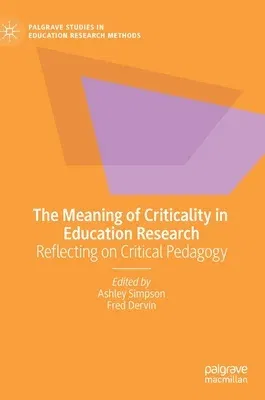The Meaning of Criticality in Education Research: Reflecting on Critical Pedagogy (2020)Hardcover - 2020, 27 November 2020

Qty
1
Turbo
Ships in 2 - 3 days
In Stock
Free Delivery
Cash on Delivery
15 Days
Free Returns
Secure Checkout

Part of Series
Palgrave Studies in Education Research Methods
Print Length
228 pages
Language
English
Publisher
Palgrave MacMillan
Date Published
27 Nov 2020
ISBN-10
3030560082
ISBN-13
9783030560089
Description
Product Details
Book Edition:
2020
Book Format:
Hardcover
Country of Origin:
NL
Date Published:
27 November 2020
Dimensions:
21.01 x
14.81 x
1.75 cm
ISBN-10:
3030560082
ISBN-13:
9783030560089
Language:
English
Location:
Cham
Pages:
228
Publisher:
Weight:
471.74 gm